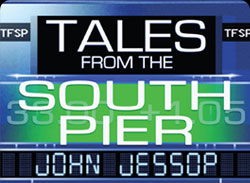Am I an Islamophobe?
By most of the current definitions that come to mind, most of them as ill-conceived as the religion itself, I suppose I am.
Does that mean I hate Muslims? Of course not; it means that I mildly deplore the religion itself and strongly despise the effect it has on too many of its adherents.
Intellectually, Islam strikes me – in keeping, I should add, with all the other established theist faiths – as a nutty religion. No less nuttier perhaps than Christianity, to name but one of the other world religions, but nutty none the less. Moreover, I disapprove of many of the practical tenets of both faiths. In the case of Islam, I fear the evangelical fervour of its fringes and despise its institutionalised, or at least conventionalised, marginalising of women and homosexuals, which can easily, and all too often does, shade into oppression and physical abuse, thereby creating problems for every civilised person with which the followers of Islam share this planet.
I am perpetually angered by the perverting effect that Islam has on its more enthusiastic adherents. I’m also disappointed by the moderate Islamic community’s apparent reluctance to condemn the extremist acts committed in the name of its faith. Yes, I’m aware that many Imams preach against hate and violence. We should expect no less. But peace and brotherhood so far hardly qualifies as a countervailing ‘movement’ against war or separatism or some of the Islamic practices and traditions that degrade well over half the human race.
And when all is said and done, I’m simply tired of hearing and reading about this weird religion, day after bloody day – and ‘bloody’ is all too often a literal term. We live, supposedly, in an enlightened age, yet we are still under threat from those who wish to return us all to an unenlightened one in the name of a deity.
Like most of my fellow non-Muslims, including the faithless, I wish that the whole topic of Islam, and whether it is a force for good or evil, would disappear from our television screens and from our newspapers.
Don’t get me wrong – although some of you undoubtedly will – I wish the faithful of all faiths nothing but good will in doing whatever it is they feel they must do to express the love of their deity, or to secure a second life in the hereafter – so long as it is done peaceably and quietly, in their own space and in their own time, rather than mine.
I suppose I should add (reluctantly, I might add) in the interest of balance, that I feel no less harshly of any religion that tries to insinuate itself into my conscious existence, the more so when it involves inflicting acts of mindless violence and needless tragedy on innocent people. Many other faiths have done so in the past, and some, for all I know, may yet do so again in the future. But it is not Catholic or Protestant, or Jewish, or Buddhist, or Hindu atrocities that I’m reading about these days every time I pick up a newspaper.
Granted the Holy Roman Church is hardly without sin in such respects, any more than are a few others I could name. But of late – meaning the last couple of centuries – even the Catholic hierarchy seems to have sanctioned a policy of live and let live with those of alternative faiths – yes, even Judaism, long hated as the religion of of ‘Christ-killers’. It took a while.
Islam, on the other hand, still seems to be mired in perpetual medieval darkness. As are most of the lands in which that faith dominates.
Does saying all this make me guilty of a race-hate crime?
It probably does, at least by the standards imposed by a society that seems to be coming consumed by the notion that criticism of anything or anyone amounts to a potentially criminal offence, with religion a particular case in point.
I have no truck with preachers of hate, whatever side of the divide they occupy, but the elevated respect reserved in particular for religious organisations is unwarranted, undemocratic and unfair. What undue respect might that be?
Well, for a start, in some western, supposedly secular countries, religious groups enjoy the special privilege of tax-free status. They do so, for example, in the United States – a country whose founders insisted on incorporating the separation of church and state into the Constitution – where criticising any religion is the moral equivalent of burning the national flag. Tax relief applies even to those fatuous invented ‘religions’: Mormonism, created by a charlatan whose ‘visions’ led him to make up ‘facts’ in the mendacious Book of Mormon; and Scientology, who believe its founder arrived on earth in a spaceship.
Similar privileges prevail in Britain, notably to protect the ’established’ Church of England, a relic from the reign of Henry XIII, whose bishops sit by ancient and undeserved privilege in the House of Lords (itself an anachronism). Even in modern, reconstructed Germany a small percentage of income tax paid by all citizens is diverted to the church, or I should say churches, since that country is dividend between a Catholic South and a Protestant North.
There, I’ve had my say. Bilious rubbish it is, too, some will say, but is what I think. And thinking is a human right, not a state-bestowed concession. It is certainly not criminal.
Even so, if someone should see fit to turn me in to the ‘authorities’ I would not be surprised. Nothing about the preservation of free speech surprises me any more.


Be First to Comment